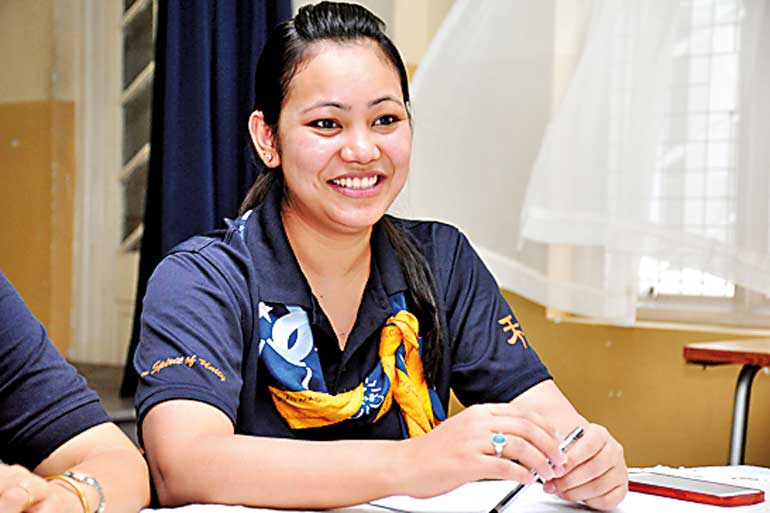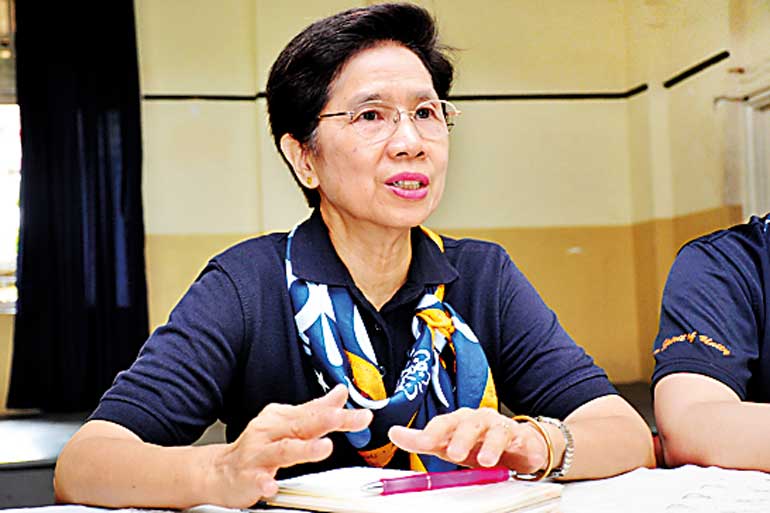The World Association of Girl Guides and Girl Scouts (WAGGS) rates the
Sri Lankan Girl Guides Association (SLGGA) quite high in terms of
performance, membership and empowering the girl child in Sri Lanka.“We
are very pleased about the service rendered by the Sri Lankan Girl
Guides Association to the local community and appreciate their hard work
and visionary,” said WAGGS Asia-Pacific region Representative
(Thailand)Lucy Ati-Chatin an interview with the Daily FT. Ati-Chat is in
Sri Lanka with WAGGS Asia-Pacific region Representative
(Nepal)PreranaShakyaRai (on a five-day visit (4-8 April) to review the
SLGAA. This review is carried out once in every three years.
 |
| WAGGS Asia-Pacific region Representative (Nepal) Prerana Shakya Rai |
The SLGGA, which was started in 1917, accounts for over 30,000
memberships spanning all nine provinces. It is a non-governmental,
non-religious organisation which is open to girls and women from all
walks of life, irrespective of their caste, religion or race. It follows
a value-based, non-formal educational programme focusing on community
development, environmental awareness, primary health-care, drug abuse
prevention, the girl child, adolescent health, HIV/AIDS and the
integration of differently-abledpersons into normal society.
 |
| WAGGS Asia-Pacific region Representative (Thailand)Lucy Ati-Chat -Pix by Lasantha Kumara |
Following their mission and vision ‘Take Pride in being a Woman,’ the SLGGA hopes to encourage girls and young women to make their own choices in decision-making at all levels. Following are excerpts of an interview with the duo:
Q: Is this your first time visit to Sri Lanka? Are you enjoying you stay here?
Ati-Chat: No, this is my second visit to Sri Lanka. I was here in 1992 and since then Sri Lanka hasdeveloped a lot.
ShakyaRai: Yes, it is. I am looking forward to my visit here as I like travelling and have always wanted to come here.
Q: What is the purpose of your visit to Sri Lanka?
ShakyaRai:This is purely a partnership visit and we are hoping to review the SLGGA which is one of our member organisations in terms of strategy; we will look at how the member organisation is working, and present recommendations on the basis of this five-day review.
Ati-Chat:We will do several presentations and assessments on the unique activities carried out by SLGGA based on the six core areas of Educational programmes, Adult training, learning and development, Membership,Relationship to society, Finance and Structure and management. We are hoping to take back some new ideas; sharing best practices as we say from here to our other member organisations and if there are some drawbacks recommend solutions and update the changes from the global aspect and the Asia Pacific region.
Q: What improvements have you noted since the last review of SLGGA carried out three years earlier?
Ati-Chat: Since the last review carried out in 2013 there has been a 37% increase in membership. Further, the SLGGA has introduced a new program called ‘Community Guiding,’ which is an inclusive movement that enables any person from any community, specially the marginalisedto take part in guiding (not a formal educational programme). It accepts any female above the age of 12 and will help achieve a larger membership base as guiding was only school-based in Sri Lanka for a long time.
Shakya-Rai: The launch of ‘Butterflies’ after the last review in 2013, which is a program for children from the ages of five to seven, is also quite successful. It is very popular and I saw the booklet recently which is very attractive. This is in addition to Little Friends and they join as members as soon as students start school. I hope that they would introduce this to community as well so we can reach a larger membership base.
Q: When comparing the SLGGA with member organisations in the Asia Pacific region, do you think it is at a satisfactory level?
Shakya-Rai:Yes, we are. The SLGGA belongs to the high-quality range of our member organisations. The rapid improvement in membership showcases this and overall we are very pleased about its performance. They have produced very competitive and good young leaders who are sent to international events which help to review the global aspects and the Asia-Pacific region’s performance to the other 146 member organisations.
Ati-Chat:This is also one of the few member organisations which has been helping and mainstreaming the differently-abled population in the country over a very long period of time (since 1924). It was introduced by the British and was started at small ward at the National Hospital in Colombo. This was attended by Lady Baden Powell herself, who enrolled many little children for this programme. Now they work with institutions like the Deaf and Blind School at Ratmalana, orphanages in Jaffna and try to incorporate them into their activities with other members. In 2011 a camp was held for these children at Ladies College Colombo followed by a similar camp in 2013 at Batticaloa. Recently, six of our differently-abled children participated in a very successful camp in South Korea and another will be held soon this year. Not many organisations spread awareness on issues like this and we would like to appreciate the commendable service of the SLGGA. We are hoping to take this experience to other member organisations.
Q: What are the current drawbacks the Association is facing?
Ati-Chat:One of the main drawbacks is the low number of members above the age of 20. We have noticed how guiding is very popular among the schooling generation but afterwards most students drop out due to the high competitive level of State exams. Now we have incorporated programs where members can join with guiding part-time or through other voluntary programs. As I mentioned above, the agelimit is not a barrier to continue guiding and the association will take more steps to encourage new members in future.
Shakya-Rai: Another problem we notice in SLGGA as well as in other member organisations is that after women get married they often do not have time to dedicate towards organisations as ours. As a result we are hoping to introduce some lightweight programmes that would help such women to join our Association.
Q: During your five-day visit to Sri Lanka will you be stationed in Colombo only or travel to other parts of the island?
Ati-Chat: We will be going on a field-trip to the North Western Province on Thursday and meet with the schools and companies there, but our work is mainly centred in Colombo.
Q: Are you hoping to provide any financial assistance to the association during your stay?
Ati Chat: Funds are the life-blood of any organisation. The WAGGS have been and will be funding and providing grants (grants to participate in international events, for training) to carry out some programmes to its member organisations from time to time. It is not something done only when a review is carried out but quite often and in times of need. Today I spoke with Chief Commissioner Jasmine and proposed to modernise the surroundings of SLGGA Headquarters and make use of the space outside but preserve the Heritage building as it is.
Q: Will you be meeting any distinguished personnel government officials during your stay?
Ati Chat:No, we will not meet with the Government as they are quite busy but the SLGGA is a part of the Ministry of Education in Sri Lanka and an accepted co-curricular activity. Hence, we will provide reports on our visit to the Ministry.
On 5 April we are scheduled to meet with our partners like John Keells Foundation, UNICEF and also media personnel.
Q: How influential do you think the SLGGA can be with regard to the Sri Lankan girl child in terms of empowering her and making her financially independent similar to your countries where female participation in the labour force is relatively higher?
Ati-Chat: At SLGGA they teach young girls and women life skills and also provide vocational training so that women are able to earn a living of their own and support their families. There is a specific programme called ‘3L; Life Long Learning,’ where women from urban low-income areas like Kirulapone, Mattakuliya and Maradana are taught skills like bridal dressing and cooking so they can run their own businesses. However, whether these women will join the labour force or not is beyond our capability.
Q: In a time where technology governs the lives of the youth, how do you think the WAGGs can positively impact the modern day girl child?
Ati-Chat: The WAGGS has already enabled membership through the internet and e-learning is also available to members in need. We have also launched an online awareness program called ‘SURF-Smart,’ which is a non-formal education curriculum designed to inform young people about how to connect positively online, protect themselves from online threats and respect their rights and reputation on the internet.This website is jointly done with SYMANTEC.
Special thanks
By HiruniDabarera/ Pix by Lasantha Kumara
http://www.ft.lk/article/536183
No comments:
Post a Comment